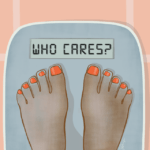Therapy is great and all, but it isn’t always realistic for everyone. I am really grateful for having had the time I did in therapy, but eventually it became unaffordable. And as someone who struggles with anxiety, depression, and disordered eating, the idea of no longer having a person to lean on terrified me. The reality is, though, so many just do it. This doesn’t mean it isn’t hard.
So, how do you begin supporting yourself in a way that feels manageable and offers a similar stability to therapy? Well, first, I want to say it isn’t easy, but it isn’t impossible either. To effectively support your mental well-being will take practice, patience, and a lot of trial and error. In fact, as someone who is currently out of therapy, it is still something I am actively working towards and always will be.
Here are some things I have studied within my Psych degree that I incorporate weekly to support my mental health when I do not have access to therapy:
- Prioritize sleep and eat consistently throughout the day. I know this isn’t easy or possible for everyone, but good sleep and regular nutrition can help lower cortisol levels, or stress, which create a good foundation for supporting mental health.
- Do one thing that is kind for yourself a day. Maybe this means making your favorite coffee in the morning, listening to your favorite playlist or audiobook on the way into work, or even just using your favorite smelling lotion.
- Do your best to remain connected with loved ones. Mental illness can feel incredibly lonely and thrives in isolation. Although it can be hard to connect with people you love daily, a simple text or phone call now and then can be a great way to care for yourself and your relationships. It may also be great to schedule a day or two once a month to spend time with friends and loved ones.
- Spend some time outside. Nature has been known to boost endorphins and improve one’s mood. It can also be great to switch up your environment if possible.
- Allow yourself to feel it. Well distractions can be great, there will also be days where sometimes sitting through it and crying may be necessary to move forward. That’s okay.
- Create expectations that are challenging, yet reasonable. Attempting to submit three projects, eat nutrient dense food, wake up by 4 a.m., and workout is probably not realistic. Instead, spend an hour on that project, prioritize rest, go for a light walk if there’s time, and aim to eat something green with one or two meals. Compromise where you can.
- Limit your time on social media. While you can create a social media space that is supportive, it can also make it easier to avoid real life, lose out on sleep, or compare yourself to others.
I hope you have the opportunity to try one of these this week! Personally, I am going to limit my time on social media and try to reconnect with loved ones (prioritizing safety of course).


